Are you seeking transparency and security in your transactions? Blockchain technology could be your answer. It not only brings greater transparency and enhanced security but also leads to reduced costs, quicker transactions, and improved traceability.
As such, many businesses and individuals are exploring the option of developing blockchain applications. If you’re one of those people, this guide will take you through the projected costs of blockchain app development in 2024.
However, building a blockchain application isn’t a walk in the park. It comes with its own challenges and costs. One of the challenges is how to hire blockchain developers. Aside from this, factors such as project complexity, developer expertise, geographical location, and platform requirements all play a role in determining the overall cost.
So, what does it cost to develop a blockchain app? Well, it varies. Yes, you read it right. A simple project might set you back around $20,000 to $30,000. When you are developing a complex one, it could exceed $200,000.
Considering all this, would you be interested in exploring blockchain app development costs in more detail? If yes, keep reading.
First off, let’s have a glimpse at:
What is a Blockchain App?
A blockchain operates as a network that organizes data chronologically into blocks. Once a transaction is made within this network, it becomes publicly accessible to all participants.
Here, all those data blocks are linked together in a chain, forming an immutable ledger that is highly resistant to tampering and corruption.
Now, talking about the blockchain app, what does it really mean?
A blockchain app, also known as a DApp, operates on a decentralized network, which removes the necessity for a central authority to facilitate transactions or exchange data. This results in a system that is secure, transparent, and highly resistant to tampering.
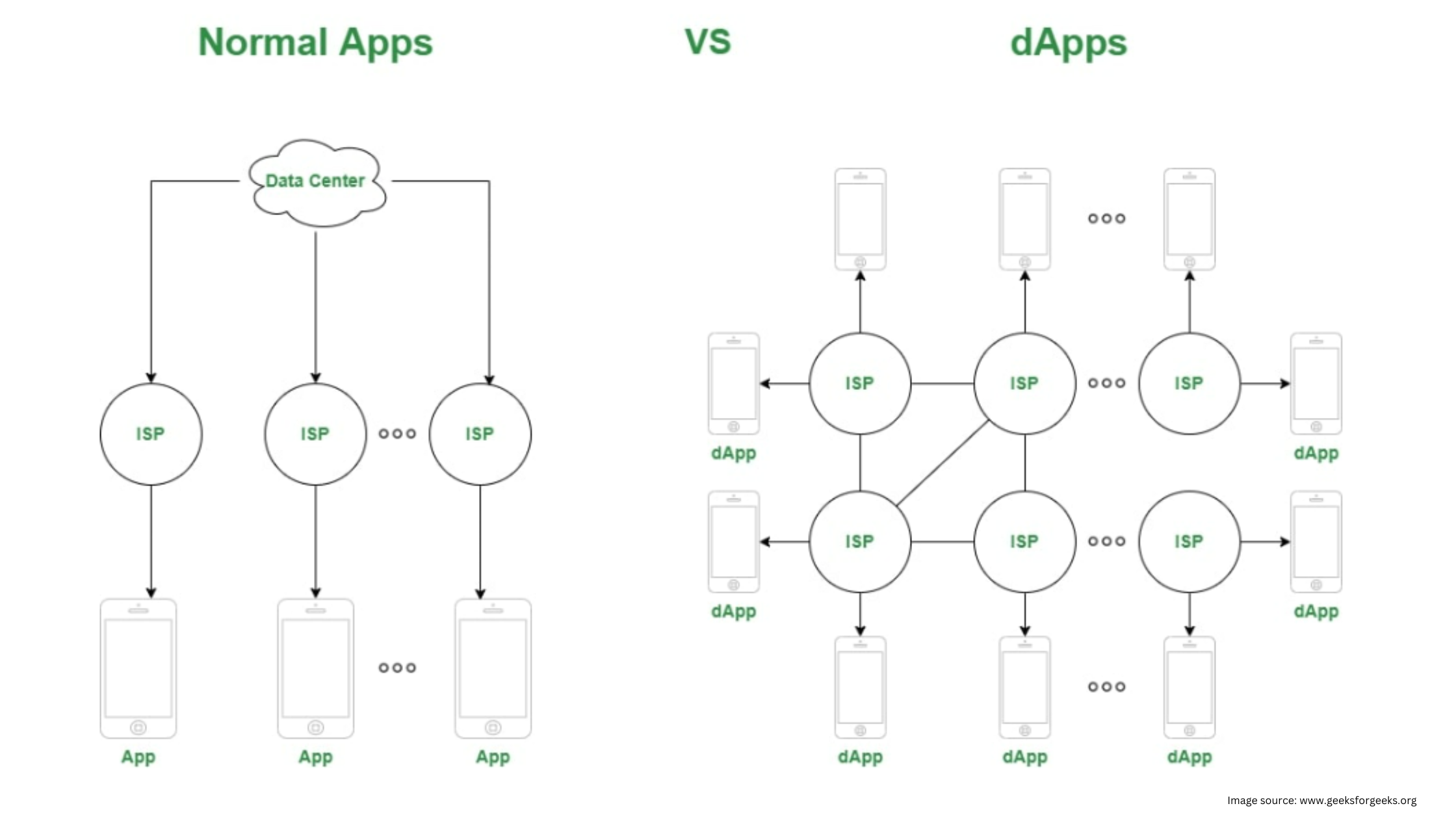
So, what sets traditional apps apart from decentralized apps?
From the user’s perspective, blockchain applications appear no different from traditional apps. They offer the same user-friendly experience while leveraging the security and transparency of blockchain technology.
As of now, there are 15.68k dApps available, given Dappradar data.

Some of the important names in this are Coinbase, eToro, OKX, Nexo, etc.
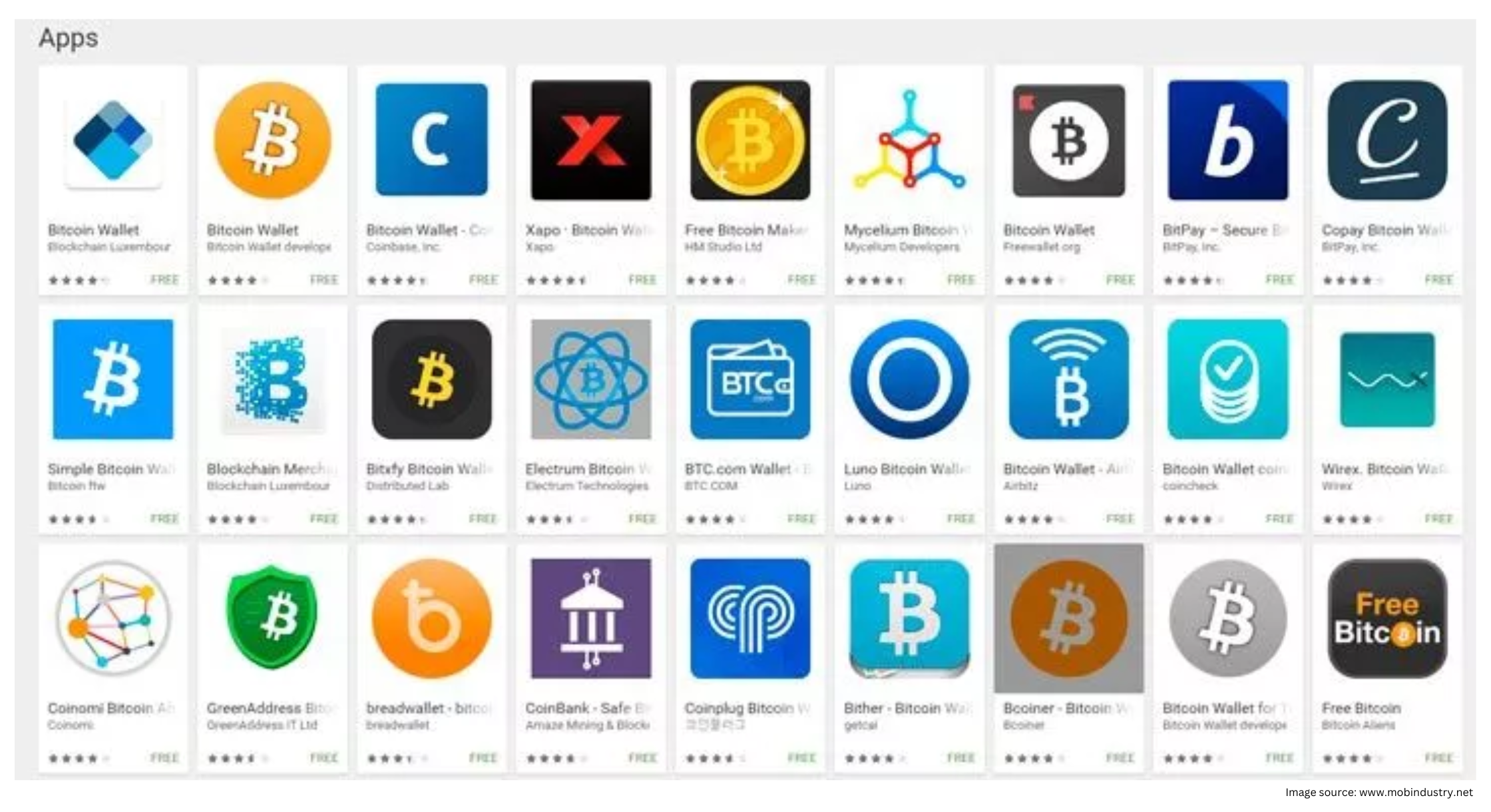
This is not the end; there are more dApps expected to surface in the coming years, with blockchain technology rapidly gaining adoption across various sectors.
Therefore, before getting into the cost of developing a blockchain app, let’s have a closer look at the blockchain app development market.
Blockchain Development Market Statistics for 2024
According to Grand View Research, there’s a big leap expected in the compound annual growth rate (CAGR) from 2023 to 2030, with an increase from $17.46 billion in 2023 to a whopping $1431.54 billion in 2030.
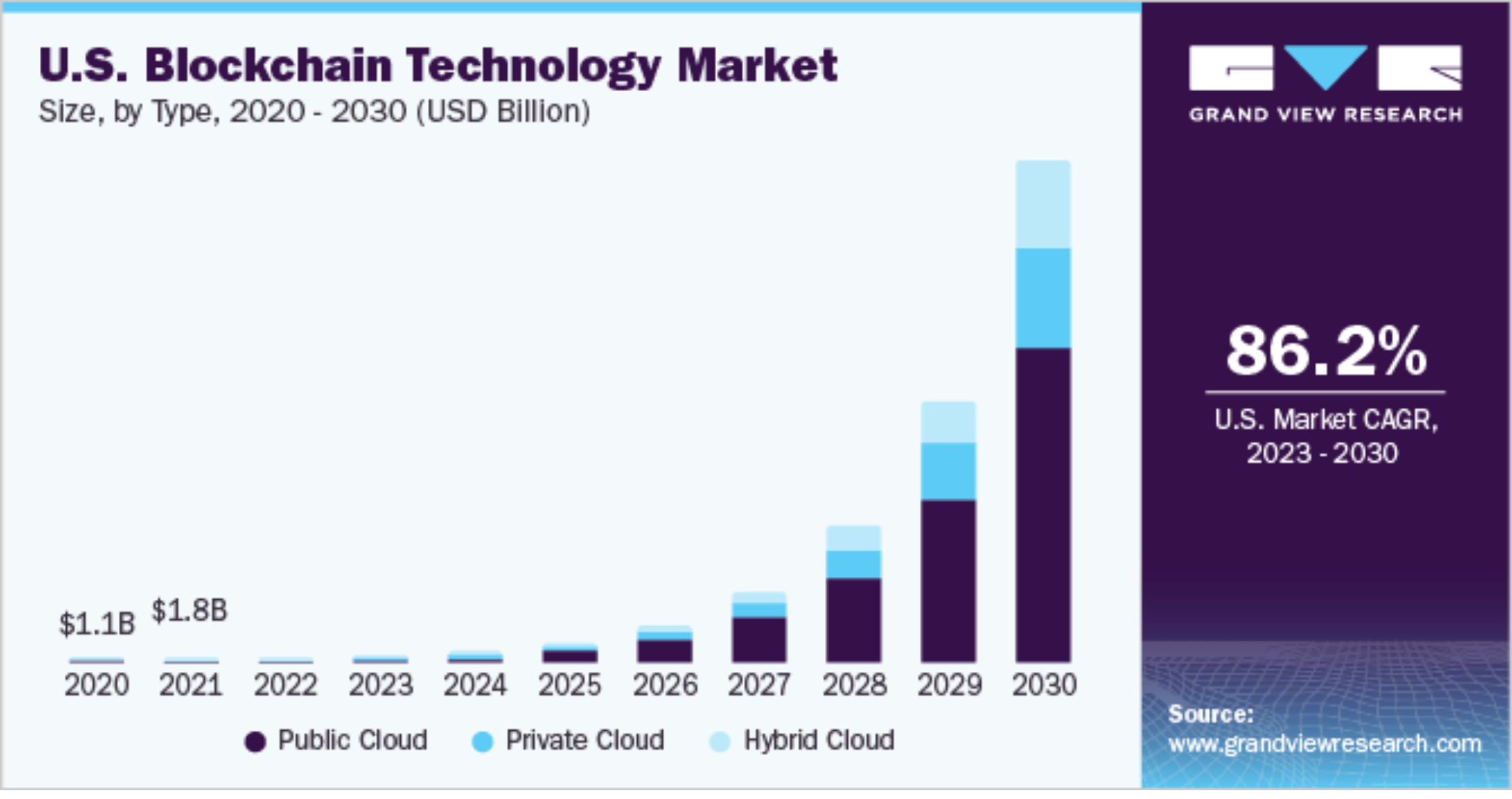
If we talk about the current blockchain technology market size, it is forecasted to hit $32.69 billion in 2024. (Source: Demandsage)
| Year | Blockchain market size |
| 2024* | $32.69 billion |
| 2023 | $19.36 billion |
| 2022 | $11.54 billion |
| 2021 | $6.92 billion |
Whether it is dApp, smart contract, or NFT marketplace development, Statista report says, the spending on blockchain solutions will be almost 19 billion U.S. dollars by 2024.
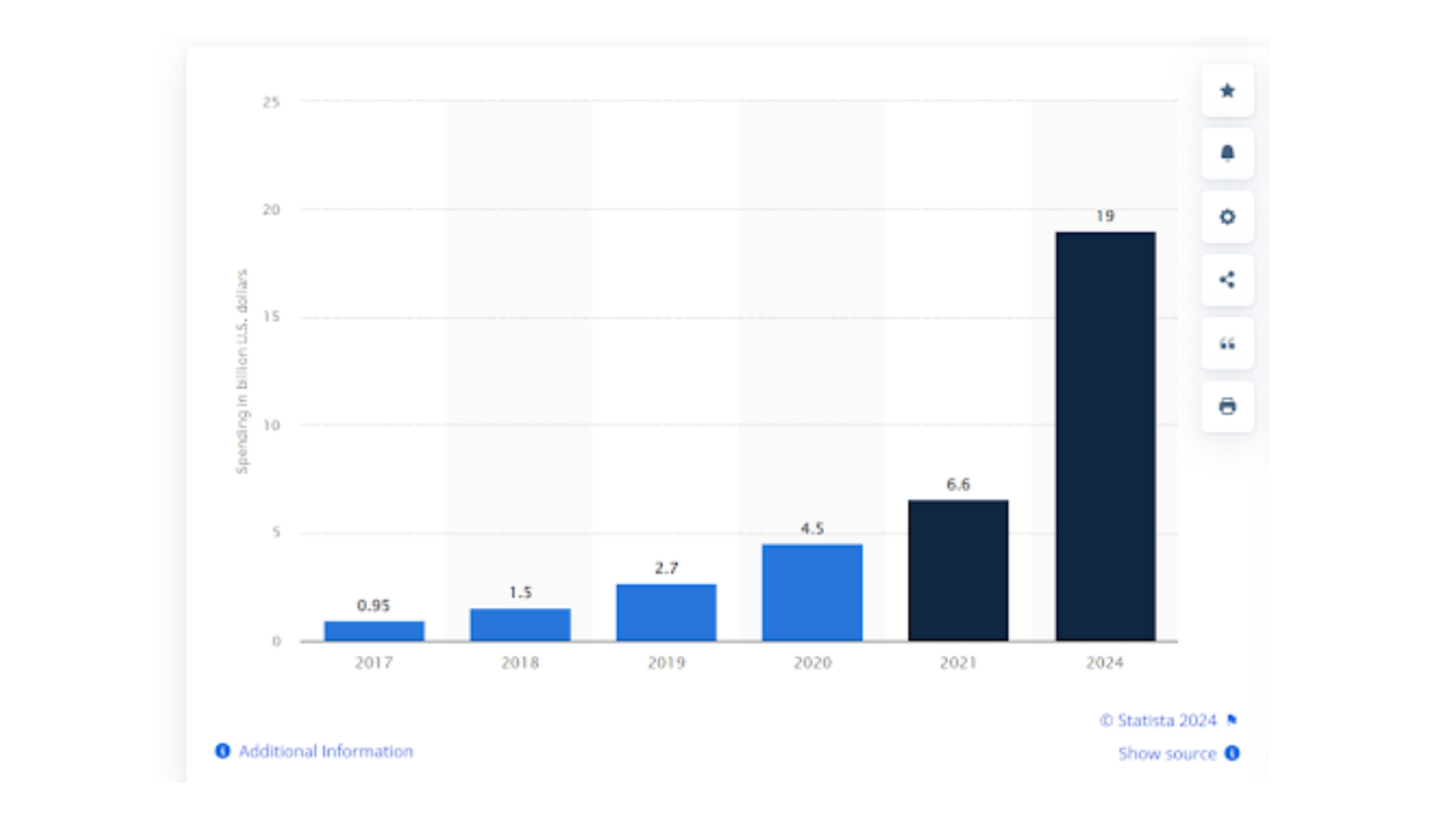
According to a survey by Deloitte, almost all leaders in the financial services industry believe that blockchain will become widely adopted in the future.
Additionally, around 40% of healthcare executives have identified blockchain as one of their top 5 priorities.
Furthermore, over 80% of central banks worldwide are contemplating the implementation of their own digital currencies.
Breaking Down Blockchain App Development Cost
In calculating the costs of developing a blockchain application, various factors come into play. We will explore those ones one by one. First off, when you are initiating any blockchain project, there is a proper process to get it done.
You can’t just jump directly into it. If you are keen to develop a dApp, first off, you will consult with an expert regarding:
- What opportunities do you have in the market?
- difficulties you might face.
- the total time of development
and so on.
So, here is a cost breakdown of the various steps in the blockchain app development process.
| Phase | Estimated Percentage | Description |
| Consulting & Planning | 15-25% | Includes feasibility studies, market research, technology selection, business process analysis, and project roadmap development. |
| Design & UX/UI | 10-20% | Covers system blueprints, user experience/interface design, wireframes, prototypes, and user flows. |
| Development | 40-60% | Encompasses coding, smart contract development, integration with existing systems, and comprehensive testing. Complexity heavily influences this cost. |
| Deployment & Infrastructure | 5-15% | For public blockchains, transaction fees and node hosting are minimal. Private blockchains require server setup, maintenance, and cloud platform costs. |
| Security Audits & Testing | 10-20% | Crucial to ensure platform and smart contract security. Cost depends on the depth and scope of the audit. |
| Maintenance & Support | 15-25% | Ongoing maintenance, updates, bug fixes, and user support. The complexity of the project again plays a role. |
| Contingency | 5-10% | Unexpected issues or changes in scope may arise. Buffering with this helps manage project costs effectively. |
Besides this, we have other factors that contribute to decentralized app development costs. What are they; asking? Let’s see-
Blockchain App Development Cost Based On App Types
Indeed, for now, the applications of blockchain technology extend far beyond just cryptocurrency. Business owners are eager to leverage its potential for a variety of purposes.
So, whether you are using blockchain for developing decentralized finance (DeFi) apps that can manage financial transactions securely or just thinking of an NFT marketplace app development to dive into the growing trend of non-fungible tokens, it is imperative to consider the associated cost.
Each type of blockchain app has its own distinct features that make it unique, thereby influencing its development cost. The most common types of blockchain apps that companies usually opt for are:
| App Type | Estimated Cost Range | Key Features |
| NFT Marketplace | $55,000 – $125,000 | Storefront for creating, buying, and selling NFTs; user profiles; token integration; payment processing. |
| Decentralized Exchange (DEX) | $80,000 – $200,000 | Order matching engine; liquidity pools; staking; multi-currency support; security audits. |
| Decentralized Finance (DeFi) App | $60,000 – $150,000 | Lending, borrowing, and yield farming functionalities; liquidity pools; smart contracts; integration with oracles. |
| Supply Chain Management App | $75,000 – $175,000 | Product tracking; document verification; provenance tracing; tamper-proof data storage; access control. |
| Voting Platform | $45,000 – $100,000 | Secure voting process; voter authentication; anonymous voting; auditable results; dispute resolution mechanism. |
| Gaming App | $65,000 – $150,000 | In-game currency and assets; digital ownership; secure transactions; user profiles; community features. |
| Social Media Platform | $80,000 – $200,000 | User profiles; content creation and sharing; decentralized data storage; censorship resistance; reputation system. |
| Ticketing Platform | $50,000 – $120,000 | Ticket issuance and management; secure access control; fraud prevention; secondary market capabilities. |
| Data Marketplace | $70,000 – $170,000 | Data storage and access control; tokenization of data; secure transactions; user profiles; reputation system. |
| Decentralized Autonomous Organization (DAO) | $10,000 – $30,000 | Governance framework; community voting; treasury management; token integration; smart contracts. |
Blockchain App Development Cost Based On Complexity
No one project can be equal to another in terms of complexity and, thus, cost. For instance, developing a basic cryptocurrency wallet app on the blockchain can be considered a simpler project; hence, the cost is likely to be lower.
The technicality, time, and resources required are significantly less compared to creating a more complex decentralized finance app.
When diving into the development of a blockchain mobile application, understanding its complexity is key. Here’s a breakdown:
- Project Scope and Purpose:
First off, consider your app’s purpose.
- What problem does it solve?
- How does it improve upon existing solutions?
Knowing this helps determine the type of blockchain app development services needed. Enterprises, especially, should ask these questions before delving into blockchain implementation.
- Consensus Mechanism Selection:
Choosing the right consensus mechanism is also crucial in blockchain app development. This could be proof of stake, proof of work, delegated proof of stake, and so on. Each mechanism has its own unique requirements and characteristics.
Aside from the consensus algorithm, other key elements such as asset issuance, user permissions, key management, cryptographic techniques (e.g., signatures and address formats), and atomic exchanges play crucial roles in designing a robust blockchain application.
- Platform Selection:
The platform on which the application will run is a key consideration. This could be platforms like Ethereum, Hyperledger Fabric, Corda, or others. The chosen platform can greatly impact the complexity and, thus, the cost of the project.
- Technological Stack:
Every platform offers its own set of blockchain programming languages and tools. For example, Ethereum is primarily programmed using Solidity, while Hyperledger Fabric relies on Golang, JavaScript, or Java. Corda allows for developing applications using Java or Kotlin.
The following technologies can also be considered when developing blockchain apps:
- IPFS/Filecoin for decentralized file storage.
- Whisper for peer-to-peer communication between nodes.
- Truffle Framework for compiling, deploying, and testing blockchain contracts.
- OpenZeppelin for reusable smart contracts.
- MetaMask: A wallet used for interaction with DApps from a browser.
- Geth: A command-line interface for running a full Ethereum node.
- Ganache: A personal blockchain for Ethereum development used to deploy contracts, develop DApps, and run tests.
- Remix is an online IDE for Solidity development that allows compiling, testing, and deploying smart contracts.
- API Integration:
While pre-built APIs exist, custom API development may be necessary for specific use cases like data authentication and smart contract management. So, if you pick a custom approach, you may have to pay more because of the effort put in by the developers.
- User Interface and Experience (UI/UX):
Once the backend aspects are in place, the focus shifts to crafting an intuitive UI and admin console. Selecting the right front-end programming language and tools is vital for creating a user-friendly interface.
| Complexity Level | Estimated Cost Range | Time Frame |
| Low | $40,000 – $80,000 | 3-6 months |
| Moderate | $80,000 – $150,000 | 6-9 months |
| High | $150,000 – $300,000 | 9+ months |
| Enterprise-grade | $300,000+ | 12+ months |
Industry-specific Blockchain App Development Costs
Another key factor that impacts the development cost of blockchain apps is the selection of industry for their application. Different industries have different demands and needs. For example, if you want to develop a blockchain app for the financial industry, it will require features like high-security encryption, data privacy, secure transactions, etc., which could significantly increase the development costs.
On the other hand, if the blockchain app is being developed for a retail business, it may require features like supply chain tracking, inventory management, and a secure payment system, which may also influence the cost, but to a different extent.
Here are a few rough estimates of the cost of developing blockchain applications for various industries:
| Industry | Typical Use Cases | Complexity Range | Estimated Cost Range |
| Finance & Banking | Payment systems, digital identity, trade finance, fractional ownership. | High – Enterprise-grade | $150,000 – $1,000,000+ |
| Supply Chain Management | Tracking, provenance, tamper-proof records, logistics optimization. | Moderate – High | $80,000 – $300,000 |
| Healthcare | Medical records management, drug supply chain tracking, secure data sharing. | High – Enterprise-grade | $150,000 – $1,000,000+ |
| Real Estate | Fractional ownership, tokenized assets, secure transactions, and title management. | Moderate – High | $80,000 – $300,000 |
| Gaming | In-game economies, digital assets, virtual worlds, and community engagement. | Moderate – High | $80,000 – $300,000 |
| Media & Entertainment | Content distribution, royalty management, digital rights management, and fan engagement. | Moderate – High | $80,000 – $300,000 |
| Energy & Utilities | Smart grids, renewable energy trading, carbon credits management, data transparency. | Moderate – High | $80,000 – $300,000 |
| Government & Public Sector | Voting systems, identity management, secure data sharing, public records management. | High – Enterprise-grade | $150,000 – $1,000,000+ |
| Non-profit & Social Impact | Charitable donations, microfinance, impact investing, supply chain transparency. | Low – Moderate | $40,000 – $150,000 |
| Logistics & Transportation | Freight tracking, document verification, insurance claims processing, fleet management. | Moderate – High | $80,000 – $300,000 |
Blockchain App Development Cost Based On Geographical Location of The Team
How much your blockchain app will cost also depends on where it is developed. That means if you decide to develop your dApp in India, the development cost may differ compared to the United States due to various factors, such as:
- the local economy,
- standard rates,
- taxes, etc.
However, the graph below shows the cost of hiring app developers in various parts of the world. It gives an idea of which place the cost of app developers is less and where it is high. So, with this, it is easy for you to hire remote developers.
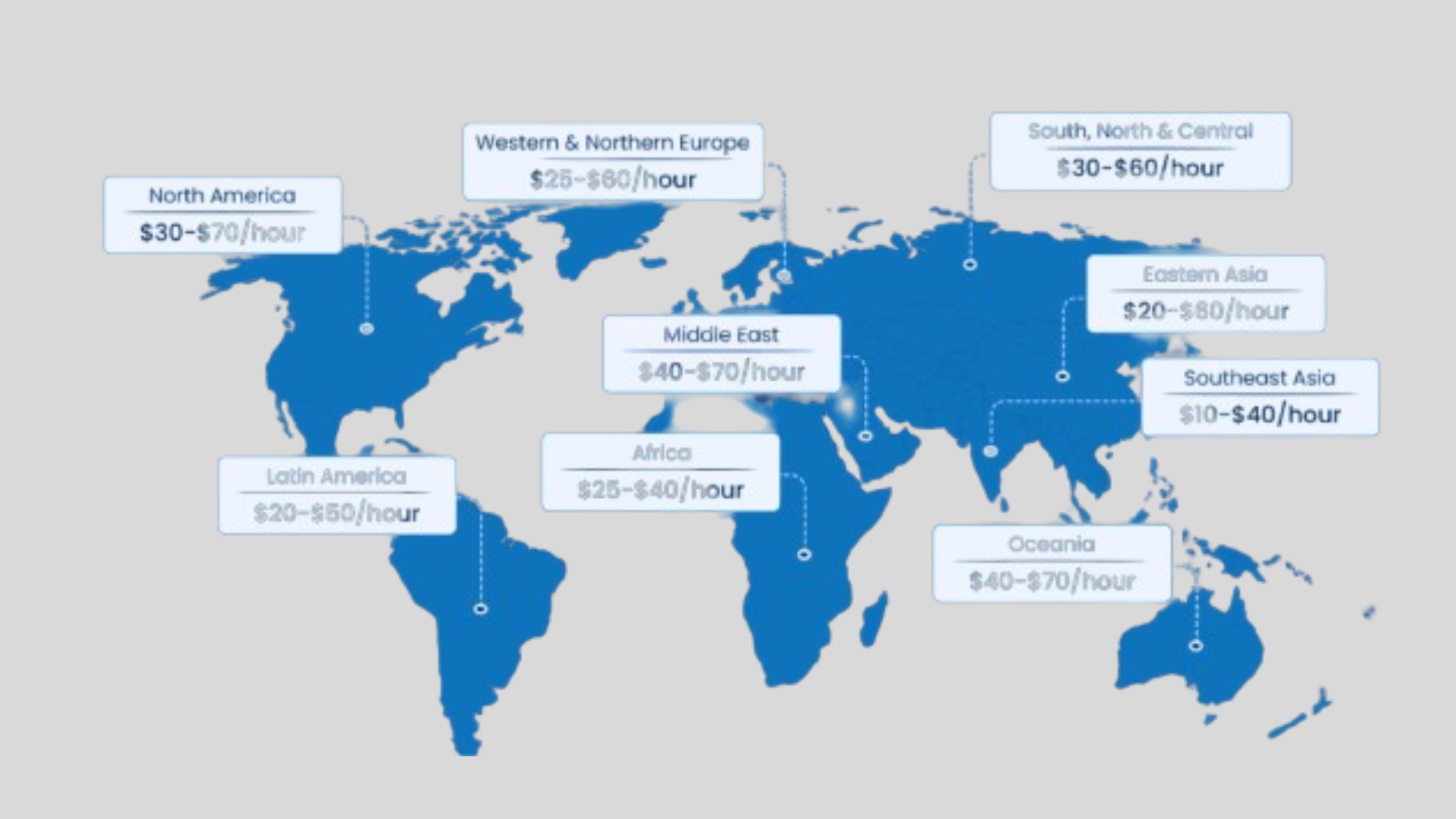
| Region | Hourly Rate Range |
| Latin America | $20-$50 |
| North America | $30-$70 |
| Western & Northern Europe | $25-$60 |
| Middle East | $40-$70 |
| South, North & Central Europe | $30-$60 |
| Africa | $25-$40 |
| Southeast Asia | $10-$40 |
| Eastern Asia | $20-$60 |
| Oceania | $40-$70 |
In a Nutshell
No doubt, developing a blockchain app is a serious investment, but considering the value and potential return on investment, it could prove to be worth every penny.
Blockchain apps offer a unique combination of a user-friendly interface, robust security, and trust, which makes them a top choice for various business applications.
As such, if you’re thinking about getting into blockchain technology, now might be a perfect time. Just remember to be mindful of the associated costs and invest wisely. Moreover, we have an in-depth discussion of how much it costs to develop a blockchain app in 2024. I hope this helps you budget for your project.
If not, you can get the help of an expert like ours. As a reliable blockchain development company, we ensure to help our clients at each stage, even if you just come to us to calculate the budget of your project.
Also read: Cryptocurrency and Blockchain Security: Challenges and Solutions
 February 9, 2024
February 9, 2024
![Blockchain App Development Costs in 2024: [A Comprehensive Guide]](https://www.i-webservices.com/wp-content/uploads/2024/02/Blockchain-App-Development-Costs-in-2024-A-Comprehensive-Guide-1568x882.png)







